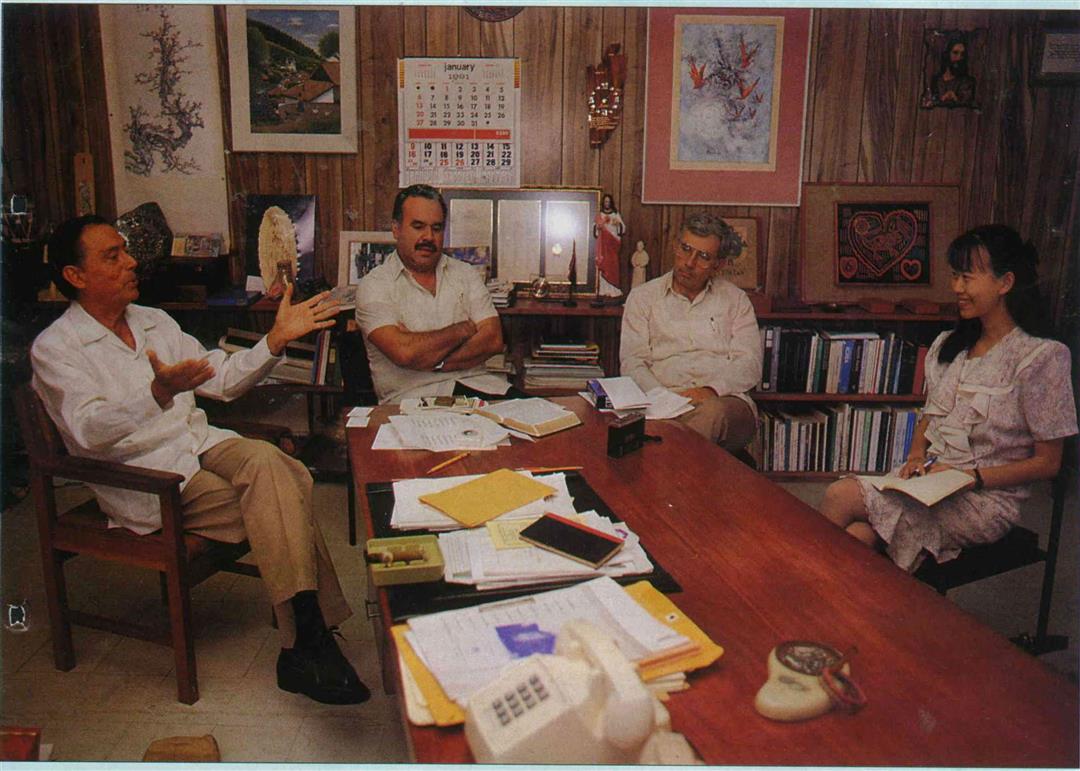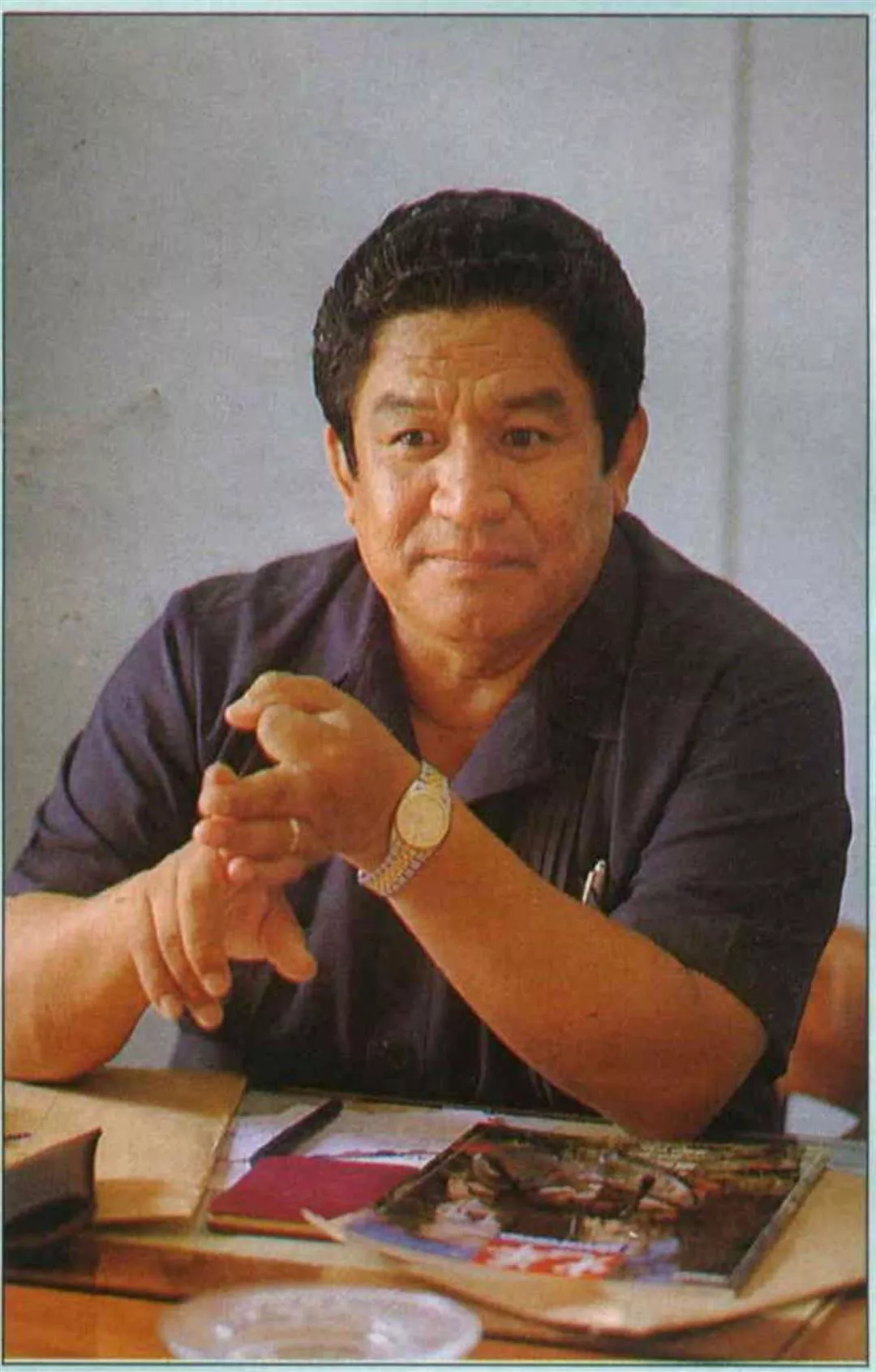Belizeans Come First: An Interview with Belizean Prime Minister George R. Price
Laura Li / photos Vincent Chang
November 1991

Amiable and approachable, Belizean Prime Minister George R. Price, (first on left) is a statesman in the mold of a founding father, having won his country's independence. To his left is Ralph Fonseca, minister of state in the Ministry of Finance, and next to him is Said Musa, chief of the ruling party and joint minister of foreign affairs, economic development and education.
Prime Minister George Price of Belize, who was chairman of the People's United Party as early as the 1960s and led the people of his country in winning independence from Great Britain, is loved and revered by his countrymen as a founding father. He ran the country for many years before stepping down in 1984 because of an election setback.
After his reelection in September 1989, Prime Minister Price immediately took steps to set up diplomatic relations with the Republic of China, and the two countries officially established relations the following month. Since then, exchanges between Belize and the Republic of China have grown ever closer. At the end of April this year, Prime Minister Price personally led a delegation of cabinet members to Taiwan.
The highlights of an interview Prime Minister Price granted to Sinorama in Belize are presented below. To ensure that our questions received detailed answers, Prime Minister Price asked Said Musa, joint minister of foreign affairs and economic development, and Ralph Fonseca, minister of state in the Ministry of Finance, to sit in with him. The warmth and sincerity of their remarks left us with a deep impression.
Q: A lot of Chinese--including people from Hong Kong, Taiwan and mainland China--have come here to immigrate and invest recently. What's your impression of them?
Price: We want them to come. We just don't want them to come buying a passport. We'd like them to have some stake in the country, some investment, maybe in the hydroelectric plan, for example.
Fonseca: The matter of capital formation in Belize is very important. We're trying more and more to get the international community involved in putting together equity to cause things to happen in Belize, and we try to channel the funds to productive areas that we consider high-priority needs. For instance, there's a group in Hong Kong that's putting together a manufacturing prospectus trying to attract serious investors to Belize.
Q: Do you ever worry that the influx of foreign investment might create economic and social disorder in your country?
Musa: That is a concern, which is why the president's slogan of "Belizeans come first" went over so well in the last election. All sorts of investment will be welcomed so long as Belizeans enjoy the benefits, but not if you just come here to make a quick buck and get out.
Q: What are the advantages and disadvantages of investing in Belize, compared to other central American nations?
Price: The big advantage is we're near the United States, a big market. And we're near Mexico, another big market. Houston and Miami are just a two hours' flight away.
Fonseca: We have several trading arrangements that most other Central American countries do not have. For instance, through the ACP (African, Caribbean, Pacific) arrangement we get all the advantages of the EEC, and of course we are a part of the CBI (Caribbean Basin Initiative) arrangement, and we are members of Caricom, the Caribbean common market. In addition, we have already joined the OAS (Organization of American States), which should open markets still further.
Musa: I think that another big factor is the factor of stability, the democracy in Belize. It's a big factor. You don't have to worry about your investment. It will be safe. You don't have to worry about expropriation, or civil unrest.
Price: And the language. Both Spanish and English are spoken here.
Q: What are your future plans for Belize? Do you want it to become an industrialized, capitalist country? Or do you want it to preserve its own unique style?
Price: We need to keep the democracy going. And to support that process we need stabilization, and for a country to be stabilized there has to be economic development, economic development that benefits all the people. So our priorities are first agriculture, to feed ourselves, and then agro-industries. Then tourism, because we are very much concerned about our environment.
Belize is a rich country in fauna and flora. We have more than 500 varieties of orchids, for instance, and over 500 varieties of birds. And we have all kinds of climates here, the mountains, the seas, the plains and the swamps. There are areas marked as natural parks. And we have the largest barrier reef in this part of the world.
We have about eight languages here, including English, Spanish, Creole and three Mayan languages. And we have at least four cultures: Caribbean-Creole, Mestizo, Mayan and European. It's a small country, yes, but with diverse treasures.
Q: It has been nearly three years since Belize and the Republic of China established formal relations. What is your opinion of the exchanges during the past year?
Price: I think our decision to have diplomatic relations with the Republic of China was a good decision and a right decision. Your country has given us a lot of substantive assistance in agricultural technology, vocational training, construction and other areas. In this world of interdependence, we must help each other, and your country is very fortunate to have a talented people with a strong work ethic who can produce for export markets. So there is a lot we can learn from you. I hope that cooperation between our two countries can develop even more rapidly.
[Picture Caption]
Amiable and approachable, Belizean Prime Minister George R. Price, (first on left) is a statesman in the mold of a founding father, having won his country's independence. To his left is Ralph Fonseca, minister of state in the Ministry of Finance, and next to him is Said Musa, chief of the ruling party and joint minister of foreign affairs, economic development and education.
Warm and sincere, Belizean Deputy Prime Minister Florencio Marin is a popular and respected figure in his country.

Warm and sincere, Belizean Deputy Prime Minister Florencio Marin is a popular and respected figure in his country.







@List.jpg?w=522&h=410&mode=crop&format=webp&quality=80)